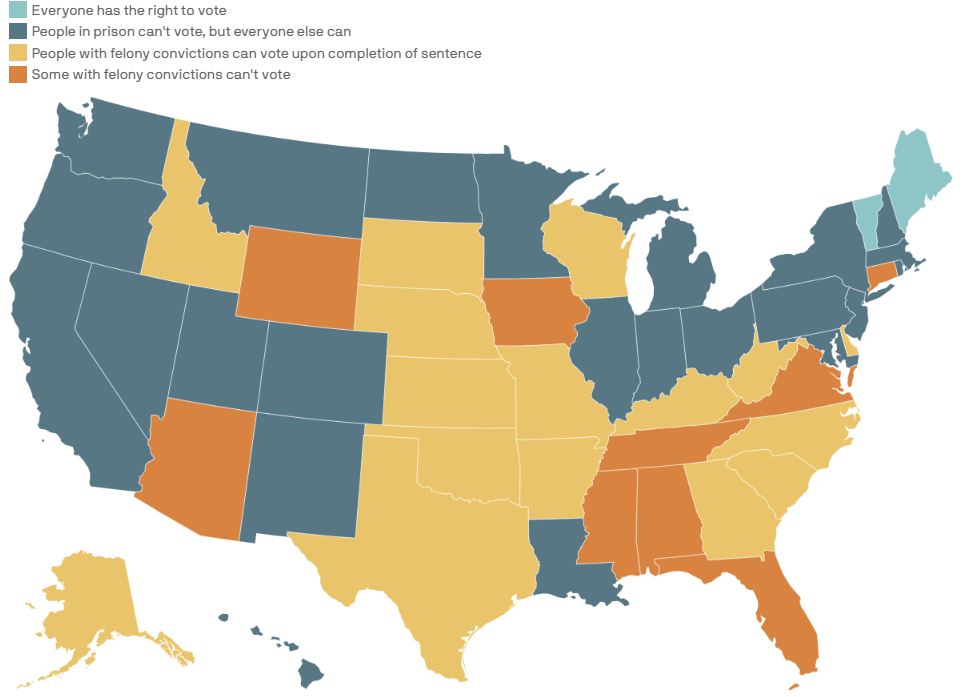Fight over felons’ voting rights heats up for 2024
By Eugene Scott
On August 14, 2023
Voting rights for formerly incarcerated people

Voting rights activists and Republican officials across the country are battling over whether felons should have their voting privileges restored once they’ve served their punishments.
Why it matters: The tussle is largely partisan, with most Republicans opposing felons voting and Democrats — including those in Congress seeking a national standard for restoring felons to voting rolls — backing the idea as a key step toward rehabilitation.
- A big reason for that divide: Felons are four times as likely as non-felons to be Democrats or politically unaffiliated, a 2019 study found. Only 20% of felons identified as Republicans after being released.
- That’s made felon voting a key point of contention in the run-up to the 2024 elections.
Zoom in: Voting laws vary from state to state. All felons can vote in Maine, Vermont and D.C., for example.
- But in Arizona, Wyoming, Iowa, Connecticut, Virginia, Tennessee, Mississippi, Alabama and Florida, voting rights are permanently taken away from those convicted of serious crimes such as murder and rape, or who have repeat felony convictions, according to the ACLU.
- In all, more than 5.8 million convicted Americans — the vast majority felons but some with misdemeanor convictions — are prevented from voting.
- The issue also is layered in racial politics: Black Americans, who make up about 12% of the U.S. population, account for about 40% of the felons who can’t vote.
Driving the news: The debate is playing out in courts, legislatures and governor’s mansions nationwide.
- A federal appeals court panel ruled this month that Mississippi was violating the U.S. Constitution’s ban on cruel and unusual punishment by disenfranchising people convicted of crimes such as murder, forgery and bigamy.
- That ruling — which could restore voting rights to tens of thousands of people — followed a decision by the conservative-leaning U.S. Supreme Court not to hear a case challenging Mississippi’s law on felon voting.
- That case focused on whether the state Constitution’s voting law, written in the Jim Crow era, should be struck down because it was designed specifically to disenfranchise those convicted of crimes the Constitution’s authors thought African Americans were most likely to commit.
In Tennessee, voting rights advocates have attacked a new rule requiring felons to be pardoned before they can vote.
- A voting rights group is suing Florida Gov. Ron DeSantis, arguing that the GOP presidential candidate violated the Voting Rights Act by ordering the arrests of 20 Florida felons who voted in the 2020 election.
- DeSantis said law enforcement officers arrested only those who weren’t eligible to vote under a 2018 state constitutional amendment because they’d been convicted of murder or a felony sexual offense.
- And in Virginia, many felons need the governor’s approval to have their voting rights restored. The NAACP has accused Virginia Gov. Glenn Youngkin (R) of slow-walking his reviews of individual felons.
- Kay Coles James, Virginia’s secretary of the Commonwealth, dismissed the NAACP’s suggestion that Youngkin has purposely delayed case reviews, and said his priority is restoring voting to non-violent offenders.
Such differences among the states are why Democrats in Congress have begun an uphill push for a national standard on restoring felons’ voting rights.
- “People who have served their time deserve to have their right to vote restored,” said Rep. Jasmine Crockett (D-Texas), a co-sponsor of the bill.
- “How are formerly incarcerated persons functioning and productive members of our society if they cannot participate in the most fundamental feature of a true democracy? The answer is, they can’t.”
- Lawmakers cite a recent survey that indicated most Americans support ensuring voting rights for citizens 18 and older, including felons still in prison.
But there has been pushback from conservatives in Washington who say Democrats are trying to take away states’ powers to decide on the issue.
- “Their plan wouldn’t let the people of Kentucky or our elected representatives in Frankfort make this important decision,” Senate Minority Leader Mitch McConnell (R) told Axios.
Zoom out: Democrats tend to be the most vocal on restoring voting rights to felons, but there is some support among Republicans.
- The nonpartisan Florida Rights Restoration Coalition is asking a federal court in Miami to require the state to establish a central statewide database so that felons can figure out if they’re eligible to vote.
- “We’re fighting just as hard for somebody who wants to vote for Donald Trump as we are for someone who wanted to vote for President Obama,” Neil Volz, a Republican and deputy director of the FRRC, told Axios.
- Volz praised Iowa Gov. Kim Reynolds as a leading Republican who supports expanding voting rights for felons who’ve completed their sentences, except for those who were convicted of homicide.
- “When someone serves their sentence, they should have their right to vote restored automatically,” Reynolds said in 2020, when she signed a bill to restore voting rights for most Iowa felons who’ve completed their sentences (those convicted of felony homicide offenses are excluded).
This piece was republished from Axios.